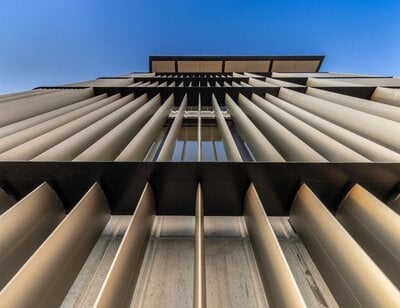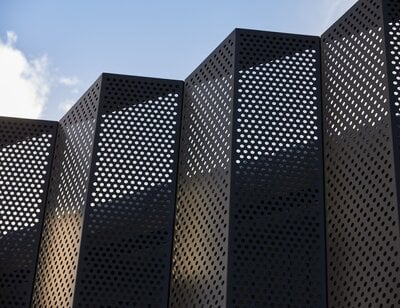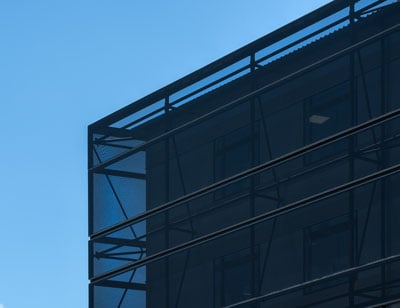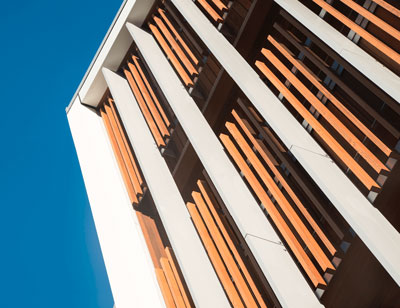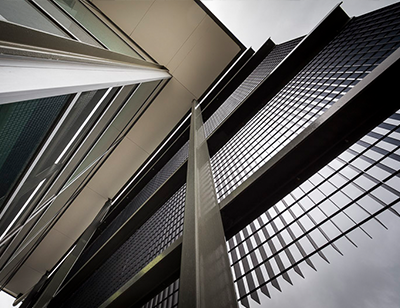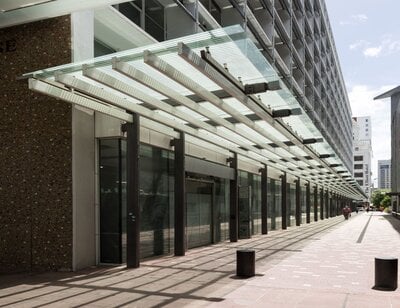The old saying has it that first impressions count. It's true. We judge a book by its cover, a person by their handshake and a meal by the first bite. A building? Well, given the visual prominence of most facades, a big part of our immediate impression of a building must come from the facade.
Maintaining a great first impression is, therefore, often as easy as maintaining the facade. And that's pretty easy too. With a little care and attention, a facade will retain its lustre and appeal for many years. That said, it pays to be mindful of the threats and the damage they might cause.
Environmental Effects on Facade Appearance
Architectural aluminium facades by the coastline are going to have a tougher life than those in a more built environment (for the most part). Salt particles carried in the atmosphere degrade the protective oxide that forms on the aluminium's defensive oxide layer. The anodisation of aluminium, or powder-coating, will help maintain the defences but even they will be overwhelmed if there is no cleaning and maintenance schedule present.
Left completely unattended, salt-laden air may eventually lead to pitting corrosion of aluminium. We should stress this would take quite a long time and mean the complete absence of any cleaning and maintenance schedule for several years.
There is a risk which poses a more immediate threat. Dissimilar metal corrosion can occur when aluminium is physically, or through an electrolyte, connected to a noble metal. The noble metal being any which has a lesser reactivity than aluminium. You can read more about the issue here. Without going into detail - keep copper, brass, lead, steel etc away from aluminium. Even if water is flushed through copper pipes and then the water, laden with copper ions, runs down onto aluminium, dissimilar metal corrosion can occur.
For buildings located in Rotorua or near geothermal environments, there is some need to be wary of geothermal corrosion. BRANZ conducted field trials in Rotorua to look at geothermal corrosion, finding the presence (albeit slowly achieved) of corrosion in Aluminium. It should be noted, the threat was less than that posed from a marine environment and the damage was significantly less that the more rapid corrosion experiences by Copper and Mild Steel.
General Care of Aluminium Facades
Stopping corrosion on aluminium is simple. You keep it clean. And we use the term 'clean' in the very loosest sense, as we apply it to a regime that requires just one 'clean' every 6 months in most areas, or every 3 months for facades within 1km of the coast, geothermal activity or in industrial areas.
The facade must be protected from coming into contact with:
- Wet cement, plaster, paint splashes, chemicals, solvents, stains and fertilisers.
- Copper, brass, lead, mild steel, CCA treated timber, cement or concrete less than one month old.
If contact does occur with any of the above, then remove the condiments immediately and wash, observing the following protocol:
Cleaning facades:
- Remove loose deposits with a wet sponge. Do not dry dust or the surfaces could be scratched. Remove any moss growth and ensure that all drainage systems nearby are unblocked.
- With warm fresh water, use a soft brush and mild household detergent to remove dust, salt or any other deposits. Take particular note of any areas not washed naturally by the rain.
- Rinse thoroughly with fresh water to remove any remaining detergent.
Some of the harsher household cleaners, thinners and solvents can be harmful and are best avoided.
If the facade has any motorised componentry, avoid the use of a high pressure hose or water blaster. These may damage the equipment and cause a failure.
Powder coated Aluminium
Whilst it's a highly durable finish that will naturally retain its lustre without much in the way of upkeep, even powder coated aluminium will benefit from a regular washing regime. A good quality soft bristled washing brush is ideal. A mild detergent may be applied to help loosen any contaminant particles, being sure any detergent residue is rinsed after the aluminium has been gently scrubbed.
Again, the regime is not required with alarming frequency and 6 monthly is acceptable in most locations. That said, a regular hose rinse every month will go a long way to maintaining a more ideal presentation.
Be careful not to use solvents on powder coated aluminium. They may cause irreversible damage to the colour and result in gloss loss within a relatively short period of time. Solvents to be avoided include acetates, dulon thinners, Methyl Ethyl Ketone, Petrol products, along with any alcohol based cleaners or those with acidic or alkali ingredients. Even milder solvents such as White Spirits should be avoided.
Anodised aluminium
The process for anodised aluminium is much the same. A mild soap solution, soft bristled brush and some 'elbow grease', are all that's needed for the aluminium to look fresh and new decades later.
Be sure to avoid using a brush that is too stiff and never use any type of abrasive material, such as steel wall. Acid and alkaline cleaners are also to be avoided, as they will damage the anodised coating.
General Tightening and Checking of Connections:
Over time, bolts and fastenings can loosen. Spontaneous loosening, also referred to as rotational self-loosening, can occur as a result of shock or vibration. Where a facade is in a high wind zone there is greater risk of this occurring. It's one of the reasons we wind test facades in the wind tunnel - we want to see how wind induced vibration can affect the fixing detail.
Mitigating any risk of the above is relatively simple. At the same time as cleaning the facade, we recommend checking connections and tightening where necessary.
All of this is essentially a really long way of saying you need to clean the facade and check the fasteners every 6 months in general, or every 3 months in an area where there are more airborne contaminants. And cleaning is pretty much like cleaning the dishes. A mild detergent and a soft brush, followed by a quick rinse.
Of course, a facade 7 storeys up adds an element of complication. Still, a facade that high up is in a more prominent position so all the more reason to keep it looking as good as it did on Day 1. Because that really is possible.

